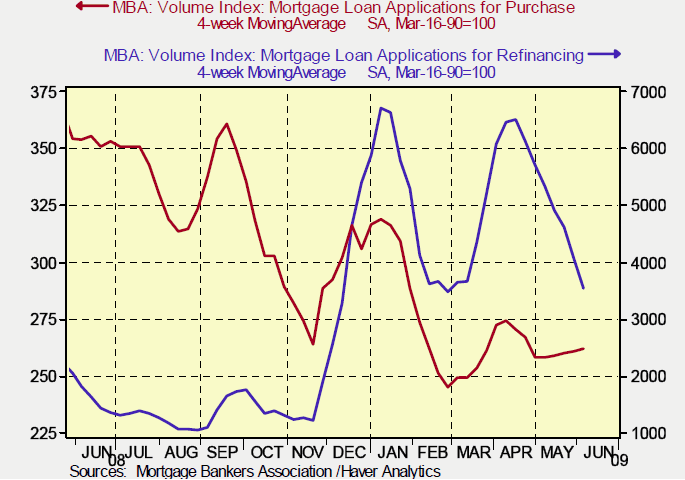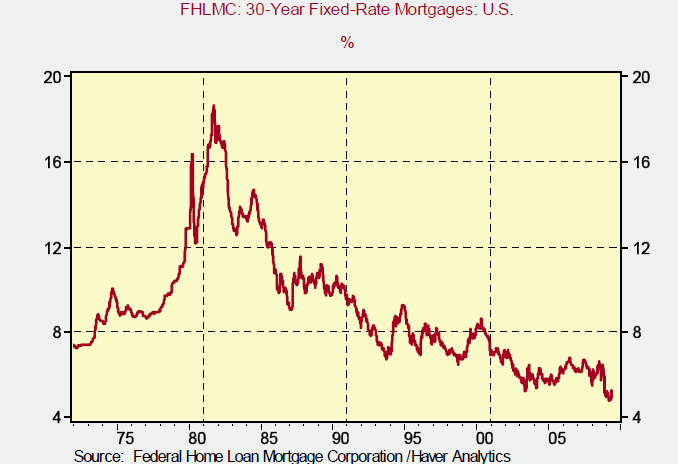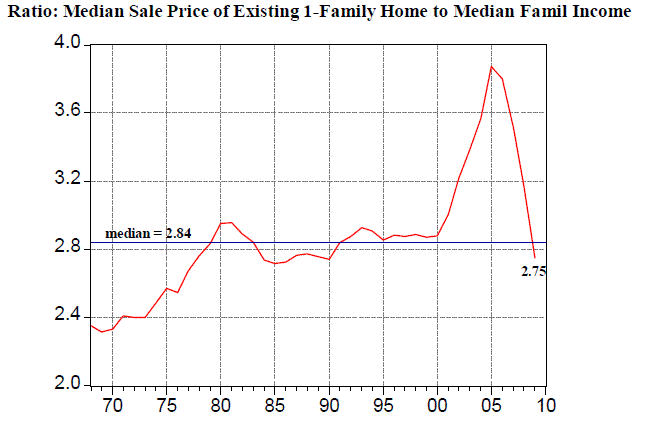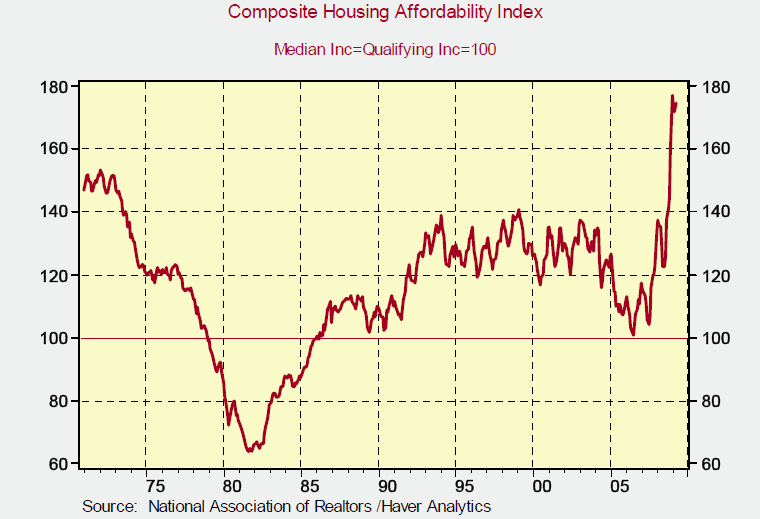Which Housing Mortgage Applications are More Important, Refinance or Purchases?
Housing-Market / US Housing Jun 10, 2009 - 07:28 PM GMTBy: Paul_L_Kasriel
 As Chart 1 shows, mortgage applications for refinancing purposes have plummeted in recent weeks as applications for purchases appear to have bottomed and entered a very mild uptrend. With regard to aggregate demand, which category of applications - refis or purchases - should we get more excited about? For my money, purchases. Why? If a refi because of lower mortgage rates does not involve the cashing out of equity, the net effect is simply a redistribution of spendable income from ultimate lenders to ultimate borrowers. Yes, with the lower mortgage rate, the borrower now has lower monthly payments and, thus, more left over for the purchases of goods and services.
As Chart 1 shows, mortgage applications for refinancing purposes have plummeted in recent weeks as applications for purchases appear to have bottomed and entered a very mild uptrend. With regard to aggregate demand, which category of applications - refis or purchases - should we get more excited about? For my money, purchases. Why? If a refi because of lower mortgage rates does not involve the cashing out of equity, the net effect is simply a redistribution of spendable income from ultimate lenders to ultimate borrowers. Yes, with the lower mortgage rate, the borrower now has lower monthly payments and, thus, more left over for the purchases of goods and services.
Chart 1

But the ultimate lender on the other side of the transaction now has lower monthly interest income and, thus, less nominal income to use for the purchases of goods and services. So, refis due to lower mortgage rates with no equity extraction, that is, no net new extension of credit, are a wash in terms of aggregate demand for goods and services. However, mortgages granted for the purchase of a house do represent the extension of new credit. If the house being purchased is an existing one, and the seller pays off a mortgage of the same or greater amount of the mortgage taken out by the purchaser, then the only increase in aggregate demand generated is the brokerage and other fees collected in relation to the sale.
If the house being purchased is a new one, then there is a net extension of credit and the value-added in the construction of the home is an addition to aggregate demand. So, whether the Fed's easy money policy is being thwarted by rising Treasury bond and mortgage rates has more to do with what is happening to mortgage applications for purchases rather than refis.
While on the subject of mortgages and mortgage rates, my June 9 commentary elicited several comments about how rising Treasury bond yields were driving up mortgage rates and would drive down home sales. The series for the Freddie Mac 30-year contract mortgage rate starts in January 1972. Since the start of the series, the lowest level of the mortgage rate is 4.78%, set in both the week ended April 3 and the week ended May 1. For the last week, June 5, the 30-year mortgage rate was 5.29%. Now, take a look at Chart 2, which contains the history of this mortgage rate series. Even at 5.29%, the mortgage rate is extremely low in an historical context.
Chart 2

Another factor besides the mortgage rate enters into the affordability of a home purchase - the ratio of the price of the house to the income of the prospective homebuyer. A history of this series is shown in Chart 3. An estimate of the ratio for the median sale price of a 1-family existing home to median family income for 2009 is 2.75. The median ratio is 2.84. This ratio is the lowest since 1990. The bottom line is that even with the recent uptick in mortgage rates, housing affordability is still very high (see Chart 4).
Chart 3

Chart 4

Another comment I received with regard to my June 9 piece was that with all the Fed purchases of different securities and with all of the government credit guarantees attached to different classes of securities, was it valid to say that declining yields on privately-issued securities reflected an increased appetite for risk? I think so. The Fed is not purchasing junk bonds or equities, yet the yields on them are falling. The Fed's massive increase in credit creation by itself would increase risk appetite in that investors would feel more confident that the economy and corporate profits are likely to improve going forward, not deteriorate. Had it not been for aggressive policy actions taken by the Fed and the Treasury in the past year, I have no doubt that there would be no increase in risk appetites. But isn't that point of these policy actions?
Paul Kasriel is the recipient of the 2006 Lawrence R. Klein Award for Blue Chip Forecasting Accuracy
By Paul L. Kasriel & Asha Bangalore
The Northern Trust Company
Economic Research Department - Daily Global Commentary
Copyright © 2009 Paul Kasriel
Paul joined the economic research unit of The Northern Trust Company in 1986 as Vice President and Economist, being named Senior Vice President and Director of Economic Research in 2000. His economic and interest rate forecasts are used both internally and by clients. The accuracy of the Economic Research Department's forecasts has consistently been highly-ranked in the Blue Chip survey of about 50 forecasters over the years. To that point, Paul received the prestigious 2006 Lawrence R. Klein Award for having the most accurate economic forecast among the Blue Chip survey participants for the years 2002 through 2005.
The opinions expressed herein are those of the author and do not necessarily represent the views of The Northern Trust Company. The Northern Trust Company does not warrant the accuracy or completeness of information contained herein, such information is subject to change and is not intended to influence your investment decisions.
Paul L. Kasriel Archive |
© 2005-2022 http://www.MarketOracle.co.uk - The Market Oracle is a FREE Daily Financial Markets Analysis & Forecasting online publication.



